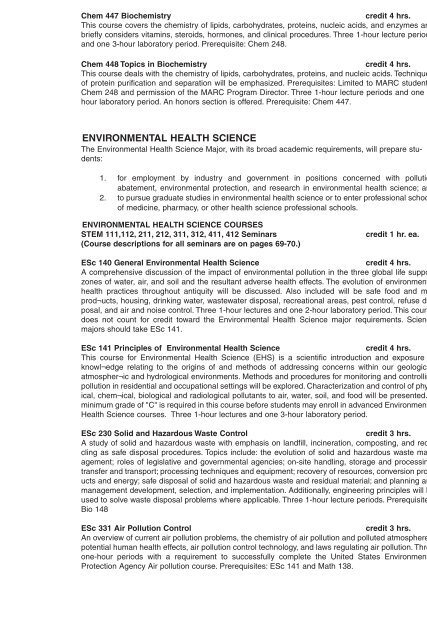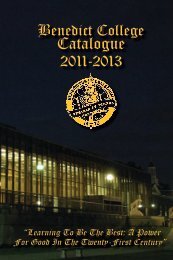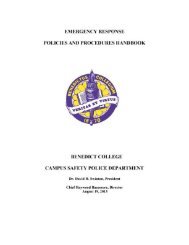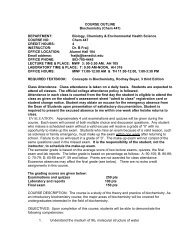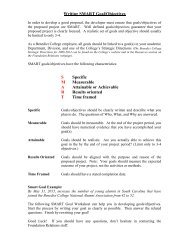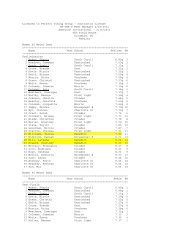2009-2011 - Benedict College
2009-2011 - Benedict College
2009-2011 - Benedict College
Create successful ePaper yourself
Turn your PDF publications into a flip-book with our unique Google optimized e-Paper software.
220 SCIENCE, TECHNOLOGY AND ENGINEERING DEPARTMENT<br />
Chem 447 Biochemistry<br />
credit 4 hrs.<br />
This course covers the chemistry of lipids, carbohydrates, proteins, nucleic acids, and enzymes and<br />
briefly considers vitamins, steroids, hormones, and clinical procedures. Three 1-hour lecture periods<br />
and one 3-hour laboratory period. Prerequisite: Chem 248.<br />
Chem 448 Topics in Biochemistry<br />
credit 4 hrs.<br />
This course deals with the chemistry of lipids, carbohydrates, proteins, and nucleic acids. Techniques<br />
of protein purification and separation will be emphasized. Prerequisites: Limited to MARC students;<br />
Chem 248 and permission of the MARC Program Director. Three 1-hour lecture periods and one 4-<br />
hour laboratory period. An honors section is offered. Prerequisite: Chem 447.<br />
ENVIRONMENTAL HEALTH SCIENCE<br />
The Environmental Health Science Major, with its broad academic requirements, will prepare students:<br />
1. for employment by industry and government in positions concerned with pollution<br />
abatement, environmental protection, and research in environmental health science; and<br />
2. to pursue graduate studies in environmental health science or to enter professional schools<br />
of medicine, pharmacy, or other health science professional schools.<br />
ENVIRONMENTAL HEALTH SCIENCE COURSES<br />
STEM 111,112, 211, 212, 311, 312, 411, 412 Seminars<br />
(Course descriptions for all seminars are on pages 69-70.)<br />
credit 1 hr. ea.<br />
ESc 140 General Environmental Health Science<br />
credit 4 hrs.<br />
A comprehensive discussion of the impact of environmental pollution in the three global life support<br />
zones of water, air, and soil and the resultant adverse health effects. The evolution of environmental<br />
health practices throughout antiquity will be discussed. Also included will be safe food and milk<br />
prod¬ucts, housing, drinking water, wastewater disposal, recreational areas, pest control, refuse disposal,<br />
and air and noise control. Three 1-hour lectures and one 2-hour laboratory period. This course<br />
does not count for credit toward the Environmental Health Science major requirements. Science<br />
majors should take ESc 141.<br />
ESc 141 Principles of Environmental Health Science<br />
credit 4 hrs.<br />
This course for Environmental Health Science (EHS) is a scientific introduction and exposure to<br />
knowl¬edge relating to the origins of and methods of addressing concerns within our geological,<br />
atmospher¬ic and hydrological environments. Methods and procedures for monitoring and controlling<br />
pollution in residential and occupational settings will be explored. Characterization and control of physical,<br />
chem¬ical, biological and radiological pollutants to air, water, soil, and food will be presented. A<br />
minimum grade of "C" is required in this course before students may enroll in advanced Environmental<br />
Health Science courses. Three 1-hour lectures and one 3-hour laboratory period.<br />
ESc 230 Solid and Hazardous Waste Control<br />
credit 3 hrs.<br />
A study of solid and hazardous waste with emphasis on landfill, incineration, composting, and recycling<br />
as safe disposal procedures. Topics include: the evolution of solid and hazardous waste management;<br />
roles of legislative and governmental agencies; on-site handling, storage and processing;<br />
transfer and transport; processing techniques and equipment; recovery of resources, conversion products<br />
and energy; safe disposal of solid and hazardous waste and residual material; and planning and<br />
management development, selection, and implementation. Additionally, engineering principles will be<br />
used to solve waste disposal problems where applicable. Three 1-hour lecture periods. Prerequisites:<br />
Bio 148<br />
ESc 331 Air Pollution Control<br />
credit 3 hrs.<br />
An overview of current air pollution problems, the chemistry of air pollution and polluted atmospheres,<br />
potential human health effects, air pollution control technology, and laws regulating air pollution. Three<br />
one-hour periods with a requirement to successfully complete the United States Environmental<br />
Protection Agency Air pollution course. Prerequisites: ESc 141 and Math 138.


